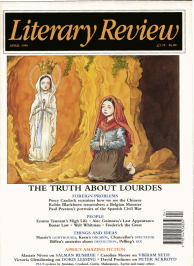Alastair Niven
Rock ‘n’ Quake
The Ground Beneath Her Feet
By Salman Rushdie
Jonathan Cape 576pp £18
This is Salman Rushdie's Diana novel. It is also his Orpheus and Eurydice novel, his rock 'n' roll novel, and his attempt to weave together traditions of myth, fable, postmodernist fiction and popular culture. The result, although the author is occasionally seduced by lists and discussions, is ebullient, versatile and riveting. Rushdie may have written novels that are politically sharper, and to some extent we have become used to his cleverness, but he has written nothing which bounces along with such sustained brio. To those readers (and I seem to know a lot of them) who say, 'I've already tried Rushdie but I always give up around page 50': try this one. It sucks you in as remorselessly as the earth swallows its heroine in the massive earthquake with which the novel opens.
Vina Apsara is the most famous woman in the world, a pop star who enthrals continents. Her sexual charge is seismic, her musicianship dazzling, her destiny epic. She is loved by Ormus Cama, the Orphean pop star who devotes his whole life to pursuing, wooing, craving, marrying or lamenting her.

Sign Up to our newsletter
Receive free articles, highlights from the archive, news, details of prizes, and much more.@Lit_Review
Follow Literary Review on Twitter
Twitter Feed
Under its longest-serving editor, Graydon Carter, Vanity Fair was that rare thing – a New York society magazine that published serious journalism.
@PeterPeteryork looks at what Carter got right.
Peter York - Deluxe Editions
Peter York: Deluxe Editions - When the Going Was Good: An Editor’s Adventures During the Last Golden Age of Magazines by Graydon Carter
literaryreview.co.uk
Henry James returned to America in 1904 with three objectives: to see his brother William, to deliver a series of lectures on Balzac, and to gather material for a pair of books about modern America.
Peter Rose follows James out west.
Peter Rose - The Restless Analyst
Peter Rose: The Restless Analyst - Henry James Comes Home: Rediscovering America in the Gilded Age by Peter Brooks...
literaryreview.co.uk
Vladimir Putin served his apprenticeship in the KGB toward the end of the Cold War, a period during which Western societies were infiltrated by so-called 'illegals'.
Piers Brendon examines how the culture of Soviet spycraft shaped his thinking.
Piers Brendon - Tinker, Tailor, Sleeper, Troll
Piers Brendon: Tinker, Tailor, Sleeper, Troll - The Illegals: Russia’s Most Audacious Spies and the Plot to Infiltrate the West by Shaun Walker
literaryreview.co.uk